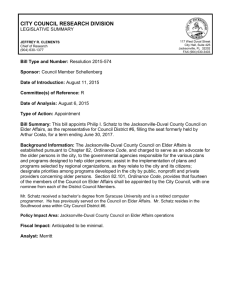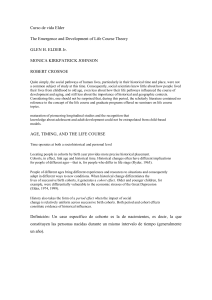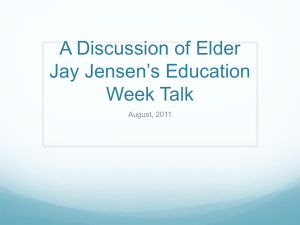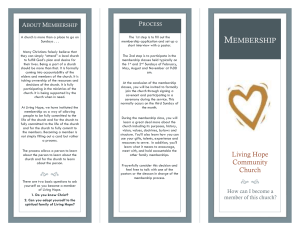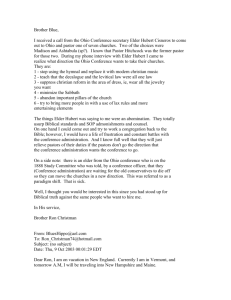Board Member Applicant Information Packet
advertisement
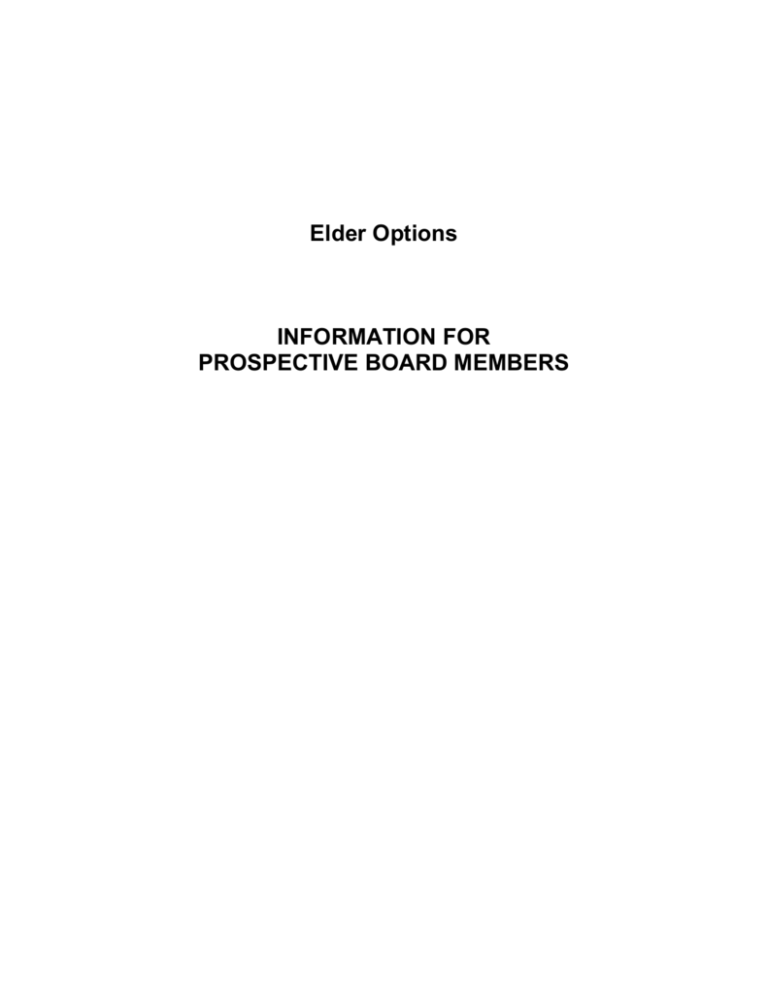
Elder Options INFORMATION FOR PROSPECTIVE BOARD MEMBERS SETTING THE PERSPECTIVE There are over 492,657 older persons age 60 years or older residing in the sixteen counties comprising mid-Florida. Most of these citizens have spent years as productive citizens looking forward to the retirement years. For a large share of older persons the lack of sufficient income and/or employment opportunities becomes a critical intervening factor. Older persons in mid-Florida are becoming increasingly active in their communities and political groups. This activity has resulted in greater attention to the needs of older persons. It has also resulted in the development of a wide range of publicly supported programs, benefits and services for the elderly. While national programs such as Social Security, Medicare, and Food Stamps have been developed to address the income needs of the older population, other programs such as nutrition, senior centers and in-home care have been implemented to serve the social and supportive needs of seniors. Older persons pride themselves on self-sufficiency and independence and want most of all to support themselves. Much has been accomplished in mid-Florida through various programs and benefits to assist our older population, but much more help and opportunity is needed to ensure dignity for older persons in their later years. WHAT WE DO Elder Options’ mission is to ensure that older adults have a trusted and unbiased place to turn for information, resources and assistance that meets their unique needs and enhances their quality of life. We advocate for and cooperatively work with communities to strengthen support systems and create new and innovative service options that focus on personal choice and independence. Elder Options serves as the Aging and Disability Resource Center (ADRC) and the Area Agency on Aging (AAA) for Mid-Florida. The ADRC provides information on programs that can help older people, caregivers and adults with disabilities remain active and independent. The ADRC also serves as a clearinghouse of information to people of all ages connecting them with information and resources for a variety of long term care needs and aging issues. When you call the ADRC, your questions and concerns will be addressed by knowledgeable and caring staff members who will link you with up-to-date information about the wide array of resources available to meet your needs. Elder Options also develops service plans and awards financial assistance to local service provider agencies such as councils on aging and social service departments for the provision of direct services to older persons and caregivers living in mid-Florida. These highly visible local organizations translate state and federal monies into tangible community-based services. The Agency's three principal funding sources are (1) the federal Older Americans Act (OAA) providing nutrition and supportive services and (2) the Florida Community Care for the Elderly (CCE) program providing home-based services as an alternative to institutional care; and (3) Medicaid Waivers (MW) providing home and facility based services to eligible frail elders. For more information on our agency please visit us on the web at http:// www.agingresources.org. 2 BOARD COMPOSITION AND RESPONSIBLITIES Elder Options is a locally controlled non-profit agency governed by a volunteer Board of Directors comprised of individuals, like you, who represent their respective county and interest in the planning and service area. As a member of the Board, you represent a most important part of the Agency's activities. Your role is exemplified by the fact that the Board is legally responsible for all official actions on behalf of the Agency, and your participation in the Board's deliberations and actions can have a meaningful effect on the direction of aging programs in Mid-Florida. The Elder Options Board of Directors is a policymaking Board. It acts as the governing body of the Agency and is responsible for making decisions on the directions of its programs, the allocation of funds, and other administrative policies. Its volunteer members do not receive any type of compensation. It is the responsibility of the Elder Options Board of Directors to appoint an Executive Director to manage the day-to-day business of the Agency. Minimum qualifications are established to ensure the incumbent is fully qualified by experience and education to direct the operations and staff of Elder Options. Elder Options Board's responsibilities can be divided into seven broad categories: 1) 2) 3) 4) 5) 6) 7) to clarify Elder Options mission; to interpret the mission to the public; to approve goals/objectives and set long-range plans; to establish policies for Elder Options operations; to be legally responsible for Elder Options operations; to ensure the stability and solvency of the agency; and, to hire and support the Elder Options Executive Director. In order for you to effectively exercise responsibility as a Board member, it is important that you become acquainted with the way the Board operates, its responsibilities and powers, and the specific rights and responsibilities you have as a Board member. It is equally important that Board members understand the major aspects of the OAA and Florida's CCE program, how systems of aging services have developed, what constitutes those systems, and how they work. QUESTIONS AND ANSWERS As a voluntary Board member, you are not expected to be technically proficient in all aspects of the field of aging. During the time that you are a member of the Board of Directors, you will periodically have questions about the programs and operations of the Area Agency. When you have questions, you should contact the staff for answers and clarification. An informed Board member is an effective Board member. To assist you in becoming acquainted with the programs and operations of the Area Agency, we have compiled a list of questions most commonly posed by Board members. Please review these 3 questions and answers......and please remember to ask the staff to answer your own questions as they arise. What is Elder Options/AAA? Elder Options is a non-profit private agency designated by the State of Florida to plan, coordinate and advocate for the development of a comprehensive service delivery system for older persons in MidFlorida. It works with federal, state and local officials; elderly constituents; service providers and the private voluntary sector to coordinate existing services and stimulate new ones. What is the Area Plan on Aging? The Area Plan is a formal contract between Elder Options and the Florida Department of Elder Affairs which explains how Elder Options intends to carry out its responsibilities under the Older Americans Act. The Area Plan also projects the use of funds which are made available to Elder Options from federal, state and local public and private sources. In keeping with the Area Plan, Elder Options contracts with local service providers in all sixteen counties of the planning and service area (PSA) for the delivery of direct services to older persons. What is the PSA? A planning and service area (PSA) is a geographical area designated by the State of Florida for purposes of planning, development, delivery and overall administration of services under the Area Plan. There are eleven PSAs in Florida. The PSA for Mid-Florida is the largest in the State covering about 11,000 square miles, or about 21% of Florida's geographical area. Counties included in our PSA are: Alachua Bradford Citrus Columbia Dixie Gilchrist Hamilton Hernando Lafayette Lake Levy Marion Putnam Sumter Suwannee Union Who runs Elder Options/AAA? Elder Options is a private non-profit corporation originally chartered on July 6, 1977. The Corporation is governed through a duly adopted set of by-laws which are periodically reviewed by the Board of Directors and amended as necessary. The Elder Options Board of Directors consists of members elected in such a manner as to ensure equitable geographical representation of the PSA. Is the Board assisted by an Advisory Council? Yes. The Advisory Council meets on a regular basis and provides guidance to the Elder Options Board and Staff on such matters as community programs and actions affecting older persons and local interests and needs of Mid-Florida's older population. 4 How is Elder Options/AAA organized? The AAA is organized in such a manner as to provide maximum effectiveness and efficiency of operations with a small professional staff. The staff is organized into four principal offices that are supported by various functional areas. The Office of Financial Operations consists of one division: Management Services, as well as Financial Reporting and Information Technology services. The Office of Access and Eligibility consists of two divisions: Consumer Counseling & Enrollment; and Information/Referral and Assistance; as well as the Serving the Health Insurance Needs of Elders (SHINE) program. The Office of Community Care Coordination consists of one division: Community Outreach and Healthy Aging, as well as Care Transitions, Caregiver Support and Training, Medicaid Waiver and internal Quality and Compliance services. The Office of Program Operations consists of one division: Contract Management. The operations of Elder Options are managed by a team approach under the leadership of the Executive Director. Each staff member assumes a significant degree of responsibility and control of the various functional areas of agency operations. What services are provided under Elder Options/AAA programs? A major function of Elder Options is to shape and encourage direct services development to meet the needs and priorities identified in the Area Plan. Elder Options is highly dependent on community input for making decisions about the types of services it funds and where services are located. The following categories of service are provided under the Area Plan: Older Americans Act Services (OAA) - The OAA provides a variety of in-home and community-based services such as caregiver training and support, chore, congregate dining, home-delivered meals, homemaker services, information and referral, transportation and nutrition education. The OAA also funds programs providing specialized services. For example: Title III C of the OAA funds the Nutrition Services Incentive Program (NSIP), which provides reimbursement for the purchase of United States-produced agricultural and other food commodities for use in nutrition projects operating under approved OAA contracts. Title III D of the OAA funds the Disease Prevention and Health promotion Program which provides evidence-based disease prevention and health promotion services and information at senior centers, meal sites and other appropriate locations. Title III E of the OAA funds the Family Caregiver Education and Support Program which provides support for the family caregiver through screening and assessment for resource referral, community outreach, educational and training opportunities tailored for the family caregiver, support group development, respite opportunities and caregiver forums. Community Care for the Elderly (CCE) - Cost-effective services like homemaker, chore, adult day care, respite care, home delivered meals and other similar services designed 5 to assist frail older persons to stay in their own homes rather than entering nursing homes. The Alzheimer's Disease Initiative (ADI) - Provides services to address the special needs of individuals with Alzheimer's disease and related memory disorders. Home Care for the Elderly (HCE) - Provides a subsidy payment to help caregivers maintain low-income elders in their own home or in the home of the caregiver. Medicaid Waiver (MW) – Assists Medicaid eligible frail elders and persons with disabilities who are at risk of nursing home placement to maintain independence while living at home or in the community. The Aging and Disability Resource Center (ADRC): The ADRC provides information and assistance, makes referrals, determines program eligibility and provides long-term care choice counseling to all elders in need of care regardless of geographic or economic considerations. The ADRC also serves as a clearinghouse of information to people of all ages connecting them with information and resources for a variety of long term care needs and aging issues. What specifically is my role as a Board Member? Your role as a member of the Board of Directors of Elder Options is to be an informed and concerned decision maker. You use your knowledge of your community and the needs of its older population, your knowledge and understanding of the aging network, your personal skills and experience and the information provided to you by older persons and others to make decisions about the manner in which aging services will be delivered in the planning and service area. What are my responsibilities as a Board Member? To be an effective Elder Options Board Member, you should be knowledgeable about the mission of the Agency and be able to interpret that mission to the general public in the community where you live. You should understand that the Elder Options Board of Directors is legally responsible for the actions of the Agency and that each Board Member has a responsibility for the stewardship of the Agency. Other basic responsibilities include: (1) being aware of and representing the needs of older persons as best you can; (2) maintaining a district-wide perspective of aging services; (3) keeping abreast of aging issues; and, (4) attending Board meetings and committee meetings. Are there any federal or state regulations that apply directly to the Board of Directors? Yes. Elder Options is required by Florida Statutes to comply with the Sunshine Law when meeting to discuss the expenditure of public funds, which requires that those meetings adhere to the statutory guidelines. Elder Options Board members are prohibited from discussing Elder Options business with each other outside of formal meetings. Elder Options is required to comply with the Florida Open Records Law. All of Elder Options records are considered public records and must be made available, upon request, to the general public. 6 Elder Options is considered a covered entity under the Federal Health Insurance Portability and Accountability Act (HIPAA). Among other things, HIPAA regulates all aspects of health care data that is collected and exchanged between health care providers and those entities that pay for the cost of the care. HIPAA also has far reaching rules intended to protect the security and privacy of personal health information that is stored and transmitted through computer networks. While Elder Options Board members only rarely come into contact with protected health information, a client complaint, grievance, or other related matter may cause the Board to review a client’s protected health information. In keeping with the confidentiality requirements of HIPAA, Elder Options requests that Board members agree to and sign a “Confidentiality Agreement.” When does the Board of Directors meet? The Board of Directors of Elder Options conducts regular meetings quarterly. Regular meetings are normally scheduled for the first Wednesday in March, June, September, and December. Special meetings are also called from time to time to handle important business of the Board which cannot be delayed until the next regular meeting. Will I be sent notices of my next meeting? Yes! You will receive advance written notice of both regular and special meetings of the Board. You will also receive minutes; any special information for your consideration prior to the Board meeting; and, any special announcements or reports for you to read. What do I need to know about aging to make a good decision as a Board Member? You need to have a general idea of what the aging network is and how services are provided to address the needs and problems experienced by the older population. A great deal of information is presented in this document to help you learn about the aging network and how it operates to benefit older persons. You should also call upon staff to explain those elements of the programs and operations which you do not understand. What is my relationship with other Board Members? You are co-workers. Members of a team with the goal of ensuring the development and operation of a comprehensive and coordinated system of services for the elderly in the Mid-Florida planning and service area. Although you will need to remember, in order to comply with the Sunshine Law, Board members are prohibited from discussing Elder Options’ business with each other outside of formal meetings. Can I bring a friend to Board meetings? Yes. It may be an interesting education for your friend. 7 If I don't come to a Board meeting, can I send a substitute to vote for me? No. There is no voting by proxy. Sorry. Is there a limit to the number of Board meetings I can miss? Occasionally, everyone becomes ill, or has an emergency and must miss a meeting. If you must be absent from a regularly scheduled meeting, we would appreciate it if you would notify the office as soon as possible. This way we will have an idea of who cannot attend and why. There is a limit to the number of Board meetings you can miss, however. After a member has missed three consecutive meetings he/she is removed from the Board. How are decisions made? By majority vote? Decisions are made by the Board in accordance with Robert’s Rules of Order. Each Director who is present at a duly called meeting is entitled to one vote. A quorum of the Board for the transaction of business is 50% of the total number of Directors at the time of the meeting. What is the Annual Meeting? The Annual Meeting of the Board is the regular meeting in December. One of the purposes of the Annual Meeting is the election of directors whose term shall expire, and election of officers (every other year), who shall take office at the conclusion of the meeting. Is membership on the Board going to cost me money? Your time and your willingness to be a member of this Board are your voluntary contributions to your community. Your travel and other costs incurred while serving on the Board are reimbursed. Hopefully, any loss to you other than the time you contribute should be minimal. Do I get mileage for attending Board meetings? Yes. At every Board meeting, you are provided a travel reimbursement form. You should complete this form and return it to staff. Your travel reimbursement check will arrive by mail at your home within a reasonable period of time. What skills do I need as a Board Member? You need lots of skills, but no specific skill. You need to be able to listen to the needs of older persons in your community; to listen to information about issues currently relevant to the aging network; to ask questions about ideas, services or trends which may have an impact on aging services in your area; and to speak up for what you believe. In other words, you need to be able to listen, to speak, to question, to wonder and to understand. 8 How can I find out what my particular community needs are? The best way to determine your local community needs is by talking to members of your community. You may wish to speak with the staff of local programs funded by Elder Options. You may also wish to speak to members of your County Commission, local educators, clergy, and your neighbors and friends. All of their opinions are valid. The aging network may not be able to address all of the needs in the community, but we do need to know about the needs in the community. What am I expected to take back to the community? You are expected to take back to the community any information you gather about aging services that are occurring. Communication is a two way street. Because of your unique position on the Board, you are able to bring information from the community to the Board as well as to take back to your community information about the aging network and programs and services for older persons. 9
